Hair growth, hair loss, hair loss treatments, vitamins for hair growth- it all seems so confusing! But don't worry, we're here to help! In this blog, we'll be discussing the different vitamins and supplements that are beneficial for hair growth in both women and men. We'll also be giving you a list of the top 5 hair growth vitamins and their respective uses. Finally, we'll provide you with a few tips on how to get the most out of multivitamins for hair growth and hair loss. So stay healthy and hair-free!
What are the different types of vitamins for hair growth?
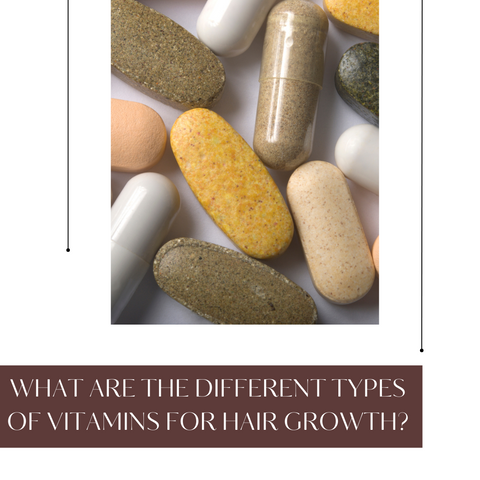
There's no question that hair growth is a two-way street. Not only do hair follicles need vitamins to function optimally, but vitamins also help hair growth in men and women. In this blog post, we'll discuss the different vitamins that are essential for hair growth in both men and women. First, we'll take a look at vitamins A, B6, and B12. These vitamins are important for hair growth in both men and women, as they help form new hair follicles and stimulate existing ones.
Next, we'll discuss zinc and omega-3 fatty acids. zinc is a mineral that is important for hair growth, as it helps form new hair cells, and omega-3 fatty acids promote healthy hair growth. Third, we'll discuss vitamins C and E. These vitamins are antioxidants, which are essential for healthy hair growth. Finally, we'll discuss the role of magnesium in hair growth. magnesium is a mineral that is essential for healthy hair growth, collagen production, blood sugar
Top 5 hair growth vitamins and minerals

There's no doubt that hair loss is a common problem, and it can be difficult to find a solution. However, there are a few vitamins and supplements that have been shown to help hair growth in women and men.
-
DHT blockers like Argan oil can help stop the accumulation of testosterone that can lead to baldness over time.
-
Zinc and Selenium are essential for healthy hair follicles, so make sure you're getting enough of them in your diet.
-
Vitamin C plays an important role in hair growth, especially when it comes to boosting levels of keratin production.
-
Biotin is a well-known vitamin for hair growth in both men and women.
Always consult with a doctor before starting any new supplement regimen, as interactions between various vitamins and minerals may occur. If you're looking for hair loss supplements that are both safe and effective, check out our top 5 hair growth vitamins!
How to use multivitamins for hair growth

Hair loss is a common problem, and it can be tough to find a solution. While home remedies for hair fall are useful, they work better in combination with doctor-recommended treatments. One thing that many people do is supplement their diet with multivitamins to help support hair growth.
Multivitamin supplements are a great way to get your daily recommended dose of vitamins for hair growth, as they are packed with essential nutrients like B-12. This essential vitamin supports healthy hair density and can help prevent loss in both men and women. Additionally, multivitamin supplements often contain minerals and amino acids, which have been shown to promote hair growth.
In addition to hair growth, multivitamins are also a great way to supplement your diet with essential nutrients. You can also get an online dermatologist consultation on Clinikally to get a personalised treatment plan to promote healthy hair growth and prevent hair fall. So, if you're looking for a way to support hair growth, multivitamins are a great option!
The role of Biotin in hair regeneration
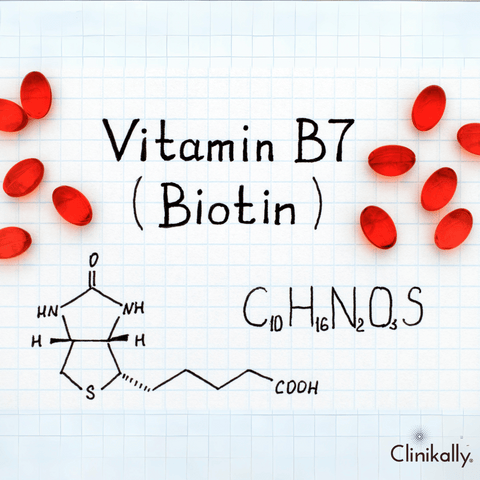
Biotin, commonly known as vitamin B7 or vitamin H, is a water-soluble B-complex vitamin essential for healthy hair, skin, and nails. While biotin is frequently connected with encouraging hair growth and regeneration, its precise involvement in hair regeneration is unclear and may differ between individuals. Biotin aids in the formation of keratin, a protein that serves as the structural foundation of hair, skin, and nails. Keratin is necessary for hair strand strength and health. Biotin contributes to this process by assisting in the metabolism of amino acids, which are the building blocks of proteins such as keratin.
However, scientific evidence for biotin's direct impact on hair regeneration is lacking. Biotin deficiency can cause symptoms such as hair loss or brittle hair; however, such deficits are uncommon and are frequently associated with certain medical diseases or dietary difficulties. Biotin supplementation may help improve hair quality and encourage some hair growth in cases of biotin insufficiency. While biotin is frequently marketed as a vitamin for hair development, the usefulness of biotin supplementation for individuals with normal biotin levels is still being debated. Some studies suggest that for people who get enough biotin from a balanced diet, further biotin supplementation may not result in significant benefits for hair growth or regeneration.
Genetics, hormonal fluctuations, nutritional deficiencies, stress, and underlying health disorders all have an impact on hair loss and hair health. While biotin helps to maintain healthy hair, resolving hair loss or encouraging hair regeneration frequently necessitates a multifaceted approach that takes all of these aspects into account. Before beginning any supplements, including biotin, speak with a healthcare expert or a dermatologist to discover the root cause of any hair-related disorders. They can make tailored recommendations depending on specific health problems and requirements.
Vitamin E and scalp circulation

Vitamin E is a fat-soluble antioxidant that plays an important role in overall health and skin health. While its particular effect in influencing scalp circulation has not been thoroughly researched, it is thought to contribute indirectly to scalp health and perhaps help enhanced circulation. A healthy scalp and hair follicles require adequate blood circulation. It ensures that necessary nutrients and oxygen are given to hair follicles properly, encouraging healthy hair development.
The antioxidant properties of vitamin E help protect cells from free radical damage, which can weaken blood vessels and inhibit healthy circulation. Vitamin E may enhance general vascular health by lowering oxidative stress, thus boosting scalp circulation indirectly. Vitamin E is also recognised for its moisturising and nourishing qualities. It can help maintain the skin's health and hydration when applied topically to the scalp, thereby fostering a healthy environment for hair follicles.
Some research suggests that using vitamin E topically or taking it as part of a healthy diet may benefit the skin, including the scalp, by supporting overall skin health. However, there has been little study concentrating specifically on the direct influence of vitamin E on scalp circulation. While vitamin E is good, excessive consumption of vitamin E supplements may have negative consequences. As a result, rather than relying exclusively on supplements, it is recommended to receive nutrients, including vitamin E, from a well-balanced diet that includes nuts, seeds, green leafy vegetables, and vegetable oils.
If a person is having problems with scalp circulation or hair health, speaking with a healthcare professional or a dermatologist can provide personalised advice and recommendations customised to their unique needs. They can recommend appropriate therapies or lifestyle modifications to help enhance scalp health and hair growth.
Best supplements for hair loss & hair growth

Hair loss and thinning hair is a common problem, and it can be tough to find a solution. But don't worry, there are a few supplements that can help improve hair growth in both men and women.
Along with a healthy diet and regular exercise, dermatologists - recommended hair loss supplements can help boost hair growth in a healthy way. Some of the best vitamins for hair growth include zinc, folic acid, vitamin B6, and iron. Try taking these supplements before starting any treatments for hair loss or baldness to ensure optimal results.
Omega-3 fatty acids and hair density

Omega-3 fatty acids are polyunsaturated fatty acids that are deemed important because the human body cannot generate them and so must receive them from diet. They are mostly found in fish (particularly salmon, mackerel, and sardines), flaxseeds, chia seeds, walnuts, and certain oils. While the direct impact of omega-3 fatty acids on hair density has not been thoroughly researched, they are known to provide a variety of health benefits, including possible benefits to hair health. Omega-3 fatty acids help to maintain overall skin health, including the scalp, which may have an indirect effect on hair density and quality. Several ways in which omega-3 fatty acids may contribute to healthier hair include:
-
Scalp Health: A healthy scalp creates an environment in which hair follicles can develop. Omega-3 fatty acids have anti-inflammatory characteristics and may aid in the maintenance of a healthy scalp by lowering inflammation and improving blood circulation to the hair follicles.
-
Moisturising Properties: Omega-3 fatty acids help to keep the scalp hydrated and nourished. This may help to reduce dryness and flakiness, resulting in a healthier foundation for hair development.
-
Anti-inflammatory Effects: Omega-3s have anti-inflammatory properties that may aid in the prevention or treatment of conditions such as dandruff or scalp psoriasis, contributing to a more favorable environment for hair growth.
-
Hair Strengthening: Omega-3 fatty acids are found in cell membranes, including those in the hair shaft. Consuming enough omega-3 fatty acids may help to improve the strength and resilience of hair strands.
While there have been few studies directly linking omega-3 fatty acids to increased hair density, ensuring an adequate intake of these essential fatty acids through a balanced diet or supplementation may contribute to better overall hair health. For maximum hair development and density, it is critical to consume a well-balanced diet rich in a range of nutrients. Always consult a healthcare practitioner or a certified dietitian before making large dietary changes or beginning new supplements, especially if you have specific concerns regarding hair density or overall health. They can provide personalised advice depending on an individual's needs and health problems.
Zinc supplements for stronger hair follicles
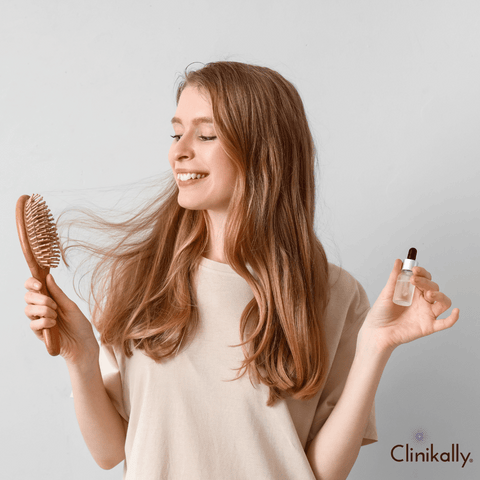
Zinc is a mineral that is needed for many body activities, including immune system support, wound healing, and keeping healthy skin and hair. It participates in a variety of enzymatic activities and aids in the growth and repair of tissues throughout the body, including hair follicles. Stronger hair follicles are required for good hair growth, and zinc has been shown to benefit hair health. It helps to keep the oil glands around the follicles operating properly and contributes to the structure of the hair. However, it is critical to maintain an appropriate zinc intake balance. Excessive zinc consumption from supplements can have negative effects and interfere with the absorption of other minerals like copper and iron. Before beginning any zinc supplementation regimen, it is recommended that you:
-
Consult a Healthcare Professional: Speak with a healthcare provider or a registered dietitian to determine if a zinc deficiency is contributing to any hair-related issues. They can assess your current diet, health status, and potential supplementation needs.
-
Consider Dietary Sources: Zinc is found in a variety of foods, including red meat, poultry, seafood (such as oysters), nuts, seeds, legumes, dairy products, and whole grains. Including these foods in your diet can help you naturally maintain adequate zinc levels.
-
Supplement Wisely: If supplementation is advised, adhere to the dose recommendations of a healthcare practitioner. It is crucial not to exceed the RDA for zinc, which is generally 8-11 mg for individuals because too much can be detrimental.
While zinc helps to promote stronger hair follicles and good hair development, it's important to approach supplementing with caution and under professional supervision. A well-balanced diet rich in zinc-rich foods, as well as overall nutritional support, is frequently the best way to maintain good hair health.
Reduce hair fall with nourished hair and scalp!
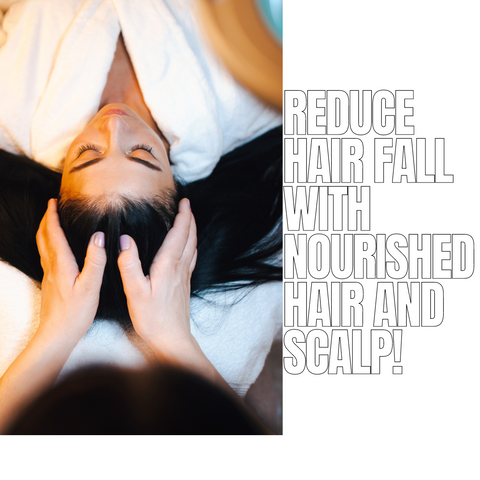
Hair loss and hair growth are two of the most common health concerns. By following the doctor's guide to the best vitamins for hair growth, you can improve your hair growth and hair loss problems in a healthy way. Multivitamins are an excellent way to supplement your diet with essential vitamins and minerals, and hair loss supplements can help to regrow hair in a healthy way. So, if you're looking for a healthy way to improve your hair growth, make sure to check out our blog!
Importance of a balanced diet for healthy hair
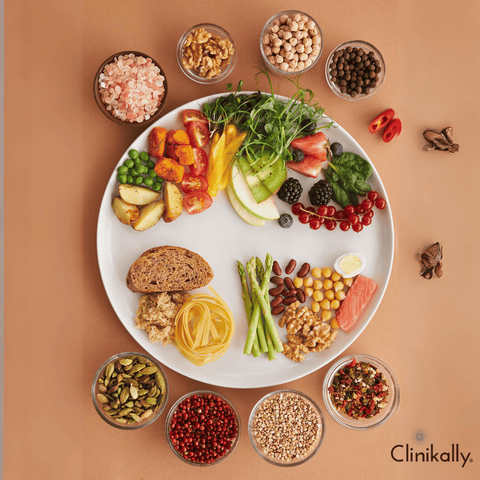
A nutritious diet is critical for promoting healthy hair since it contains essential nutrients that support the growth, strength, and overall health of hair follicles. A balanced diet provides several critical elements that contribute to healthy hair:
-
Protein: Keratin, a protein, is the main component of hair. Consuming enough protein from sources such as lean meats, fish, eggs, dairy products, legumes, nuts, and seeds aids in the growth and repair of hair tissues.
-
Vitamins: The following vitamins play important roles in hair health such as Vitamin A, Vitamin C, Vitamin E, and Vitamin D.
-
Minerals: Minerals such as iron, zinc, and selenium are essential for hair health.
-
Omega-3 Fatty Acids: These can help prevent dryness and inflammation of the scalp and are found in walnuts, flaxseeds, chia seeds, and fish.
-
Biotin: A B-complex vitamin that supports keratin infrastructure. Eggs, nuts, seeds, and whole grains are all good sources.
-
Water: Staying hydrated is essential for overall health, including hair health. It keeps the scalp and hair hydrated.
While diet is important, other factors such as genetics, hormone imbalances, stress, and certain medical disorders all have an impact on hair health. As a result, living a healthy lifestyle, regulating stress, and obtaining professional guidance when necessary are all important components of having healthy hair. Consult a healthcare expert or a trained dietitian for personalised advice on how to improve your diet to promote healthy hair.
Natural sources of hair growth vitamins

Numerous vitamins are required for healthy hair development and maintenance. Vitamin A, Vitamin B Complex (Biotin, B5, B6, B12), Vitamin C, Vitamin D, Vitamin E, Iron, Zinc, and Omega-3 Fatty Acids are some natural sources of these vitamins. While these vitamins and minerals help with hair development, a well-balanced diet that includes a variety of nutrient-rich foods is essential. It's crucial to note that everyone's nutritional demands differ, and an overabundance of some vitamins may not result in enhanced hair growth and may even be harmful. It is best to speak with a medical practitioner or a registered dietitian before taking any supplements to make sure the right dosages are being taken and that they are appropriate for your particular nutritional needs and state of health. Additionally, addressing any underlying health issues affecting hair growth and seeking professional advice is critical for maintaining optimal hair health.
The impact of antioxidants on hair health

Antioxidants have an important role in overall health, including hair health. They aid in the neutralisation of free radicals, which are unstable chemicals that can cause oxidative stress and harm cells throughout the body, including the scalp and hair follicles. Here's how antioxidants can help your hair:
-
Protecting Hair Follicles: Free radicals can damage hair follicles, resulting in weaker hair strands or even hair loss. Antioxidants protect these follicles by neutralising free radicals, potentially preserving their health and function.
-
Scalp Health: A healthy scalp is essential for healthy hair growth. Antioxidants help to keep the scalp healthy by reducing inflammation, preventing oxidative damage, and promoting proper blood circulation to the hair follicles.
-
Supporting Hair Strength and Structure: Antioxidants, including vitamins C and E, aid in the creation and maintenance of collagen. Collagen is necessary for the strength and structure of hair strands, as well as their resistance to injury.
-
Delaying Aging Effects: The aging process, including premature greying of hair, can be accelerated by oxidative stress. Antioxidants may help reduce the aging process by minimising oxidative damage to cells, potentially postponing premature greying.
While antioxidants have several health benefits, including potential hair health support, it's vital to get them from a well-balanced diet rather than depending entirely on pills. Consuming a variety of fruits, vegetables, nuts, seeds, and whole grains guarantees a diverse intake of antioxidants as well as other critical nutrients, which contribute to general health and healthy hair development.
Understanding the impact of deficiencies on hair health
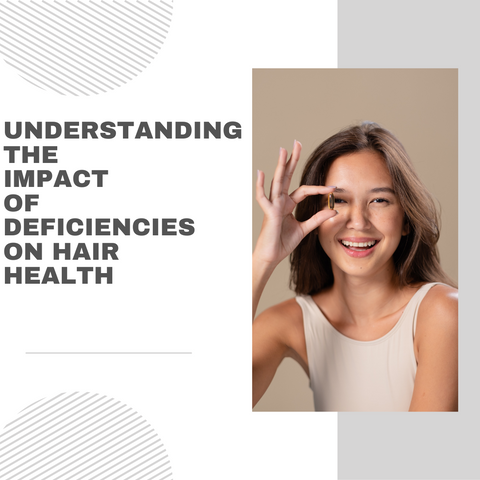
Nutrient deficiencies can have a substantial impact on hair health. When the body lacks necessary vitamins, minerals, and proteins, it can show itself in a variety of ways, hurting hair development, strength, and look. Here's a rundown of some of the most common vitamin deficiencies and their effects on hair health:
-
Iron deficiency: Iron is essential for supplying cells, including hair follicles, with oxygen. Hair follicles may receive less oxygen as a result of iron deficiency (anaemia), which can cause thinning, brittleness, and hair loss.
-
Vitamin D Deficiency: Low vitamin D levels can interfere with hair follicle cycling and contribute to hair thinning or alopecia.
-
Excess or Deficiency of Vitamin A: Both excess and deficiency of vitamin A can cause hair loss. While a lack of vitamin A can cause dry, brittle hair, an excess can also cause hair loss.
-
Deficiency in biotin (Vitamin B7): Biotin is required for the production of keratin, a protein essential for hair growth. Biotin deficiency can cause brittle hair and even hair loss.
-
Vitamin B12 Deficiency: Inadequate vitamin B12 levels can affect red blood cell production, leading to anaemia, which in turn affects hair health and can result in hair thinning or loss.
-
Protein Deficiency: Since protein (keratin) makes up the majority of hair, a diet low in protein can cause hair to deteriorate, grow more slowly, or even fall out.
-
Zinc Deficiency: The growth and repair of hair depend on zinc. Hair thinning, shedding, and slower hair growth can result from zinc deficiency.
-
Omega-3 Fatty Acid Deficiency: A diet low in omega-3 fatty acids may cause hair loss, dull hair, and dry scalp.
-
Copper deficiency: Melanin, the pigment responsible for hair color, is produced in part by copper. Premature greying may be the result of deficiency.
Maintaining optimal hair health requires addressing these deficiencies with a well-balanced diet rich in fruits, vegetables, lean proteins, nuts, seeds, and whole grains. It is crucial to note, however, that excessive ingestion of certain minerals might have negative consequences. If deficiencies are detected, it is best to contact a healthcare expert or a qualified dietitian to establish appropriate dietary adjustments or supplementation. They can offer tailored advice based on an individual's health status and needs.
Signs of vitamin deficiency in hair

Vitamin deficiencies can appear in a variety of ways, and the state of your hair can reveal potential inadequacies. Here are some indicators of vitamin insufficiency that you may see in your hair:
-
Brittle Hair: Vitamin deficiencies in the form of biotin, vitamins A and D, and essential fatty acids like omega-3s may be the cause of brittle or dry hair that breaks easily.
-
Hair Loss: Several deficiencies, such as those in iron, biotin, zinc, vitamins B12 and D, and biotin, may manifest as excessive hair shedding or noticeable hair loss.
-
Dull or Lacklustre Hair: If your hair seems lifeless or lacklustre, it may be a sign that you are not getting enough omega-3 fatty acids and vitamins C, E, and A.
-
Slow Hair Growth: Inadequate consumption of important nutrients such as protein, biotin, and vitamins A, C, D, and E may be the cause of slow or stunted hair growth.
-
Early Greying: A deficiency in copper, vitamin B12, and some antioxidants may cause hair to grey before its time.
It is important to remember that vitamin deficiencies may not be the only cause of these symptoms. Other factors that can affect hair health include heredity, stress, hormonal changes, underlying health disorders, and environmental factors.
Correcting iron deficiency for hair growth

Iron deficiency can hurt hair health, causing thinning, brittleness, and even hair loss. Iron deficiency must be addressed to promote healthy hair development. Here are some tips for dealing with iron deficiency for better hair health:
-
Dietary Changes: Increase your iron intake by eating more iron-rich foods. Choose iron sources found in animal products such as red meat, poultry, fish, and shellfish. Beans, lentils, tofu, spinach, fortified cereals, and pumpkin seeds are all good sources of non-heme iron. Combining these foods with vitamin C sources (such as citrus fruits, bell peppers, and broccoli) can improve iron absorption.
-
Iron Supplements: A healthcare provider may offer iron supplements to improve iron levels in cases of severe iron insufficiency. These supplements should only be taken as directed by a healthcare professional, as too much iron can be harmful.
-
Regular Monitoring: Periodic blood tests are essential for monitoring iron levels and ensuring they are within normal limits. Based on your specific needs, your healthcare professional can decide the proper testing frequency.
-
Iron Absorption Limiting Inhibitors: Certain chemicals can inhibit iron absorption. Consuming calcium-rich foods or supplements at the same time as iron-rich foods or supplements, for example, should be avoided since calcium can inhibit iron absorption. Tannins in tea and coffee, as well as phytates in various grains and legumes, can also limit iron absorption. Consume these in addition to iron-rich meals.
-
Addressing Underlying Causes: Iron deficiency can be caused by underlying diseases such as gastrointestinal issues or heavy menstrual flow in women. Treating the underlying cause is critical for preventing iron shortages from recurring.
-
Consultation with a Healthcare Professional: Before making significant dietary changes or beginning supplements, always consult with a healthcare provider. They can provide advice tailored to your specific needs and ensure that iron deficiency is managed appropriately without causing potential health risks.
Improving iron levels might take time; therefore, patience is required. Consistency in dietary adjustments or supplementation, as well as regular monitoring and direction from a healthcare expert, are required to correct iron deficiency and encourage better hair development and general health.
The science behind hair growth and nutrition
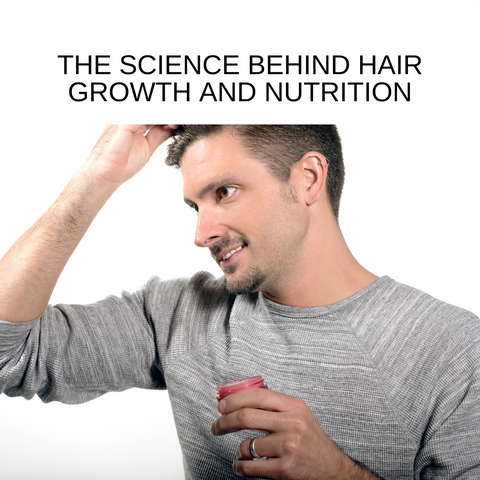
Hair growth is a complicated process that is controlled by a variety of factors, such as heredity, hormone balance, age, and overall health. Nutrition is critical to promoting the growth and health of hair follicles, which are responsible for hair production. Here's how nutrition affects hair development, including protein, vitamins and minerals, omega-3 fatty acids, antioxidants, and hormonal balance. When the body lacks crucial nutrients, it may prioritise vital activities over less important ones, such as hair growth, resulting in hair thinning, dryness, brittleness, or hair loss.
A balanced diet rich in nutrient-rich foods is vital for ensuring appropriate consumption of these essential nutrients for optimal hair health. A nutritional shortage can affect the hair growth cycle, causing alterations in the rate and quality of hair growth. While diet is crucial, it is also vital to recognise that other factors, such as heredity and specific health problems, contribute to hair growth. Addressing any underlying health issues, managing stress, and living a healthy lifestyle are all significant factors in promoting good hair development.
How protein intake affects hair growth

Protein consumption is essential for promoting hair development and maintaining the health of hair follicles. Because hair is mostly formed of a protein known as keratin, ensuring an adequate protein intake is critical for supporting healthy hair growth and preventing concerns such as hair loss or brittleness. The following is how protein consumption influences hair growth:
-
Keratin Production: Protein is required for the formation of keratin, the structural protein that comprises the hair shaft. Adequate protein consumption ensures that the body has enough amino acids, the protein's building blocks, to produce strong and healthy hair strands.
-
Supports Hair Follicles: Hair follicles require a steady supply of nutrients, particularly protein, to promote hair growth and upkeep. Inadequate protein consumption can weaken hair follicles, resulting in decreased hair growth and potential hair loss.
-
Stimulates Hair Growth: Protein consumption enables the body to maintain an ideal environment for hair development. It promotes the active growth phase of the hair cycle, known as the anagen phase.
-
Prevents Hair Breakage: Protein helps to strengthen and resiliency of hair strands. Protein helps to prevent hair breakage by keeping hair strands strong and less prone to damage.
While protein is necessary for hair health, increased protein consumption does not always result in additional benefits for hair development. The body has a limit to how much protein it can use, and a high-protein diet may not bring further benefits for hair and may even cause other health problems.
The truth about Vitamin A and hair growth
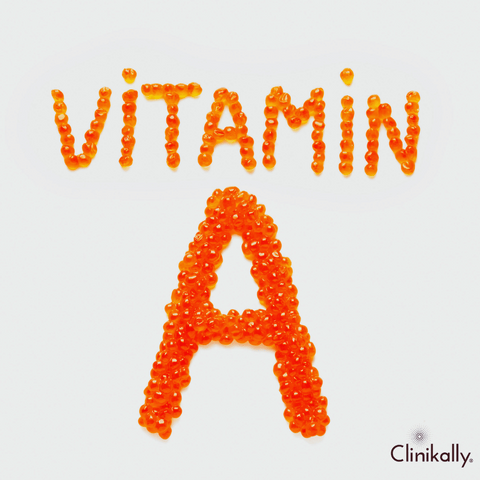
Vitamin A is a fat-soluble vitamin that is required by the body to maintain healthy skin, eyesight, immunological function, and cell growth. While proper levels of vitamin A are required for overall health, excess or shortage can have an impact on hair health. The reality regarding vitamin A and its relevance to hair development is as follows:
-
Role in Hair Growth: Vitamin A aids in the formation of sebum, an oily substance that moisturises the scalp and maintains the health of the hair. Proper sebum production aids in the prevention of a dry scalp, which can lead to hair breakage. Excess vitamin A, on the other hand, can be harmful to hair health.
-
Impact of Excess Vitamin A: Too much vitamin A can be dangerous, resulting in a condition known as hypervitaminosis A. Excessive vitamin A levels, whether obtained from supplements or high-dose retinoid drugs, can result in hair loss as a side effect. Hypervitaminosis A can cause hair thinning or shedding by interfering with the regular hair development cycle.
-
Importance of Balance: It is essential to maintain a healthy level of vitamin A consumption. While the body needs vitamin A for many tasks, including scalp health, ingesting too much can have a negative influence on hair development and overall health.
-
Sources of Vitamin A: Preformed vitamin A (retinol) is acquired from animal products such as liver, fish oil, eggs, and fortified foods, while provitamin A carotenoids are present in colorful fruits and vegetables such as carrots, sweet potatoes, spinach, and kale. As needed, the body transforms these carotenoids into vitamin A.
Maintaining a healthy vitamin A intake through a varied diet that includes a variety of these sources is generally beneficial for overall health, including hair health. To avoid potential bad effects on hair growth and other health issues, it is critical to avoid using vitamin A pills in excess, especially without medical supervision. If a person suspects vitamin A insufficiency or over-intake and is experiencing major hair-related concerns, he or she should consult a healthcare expert or a qualified dietician. Based on individual demands and health status, they can recommend appropriate dietary modifications and manage any hair health concerns.
Personalized vitamin regimens for hair care
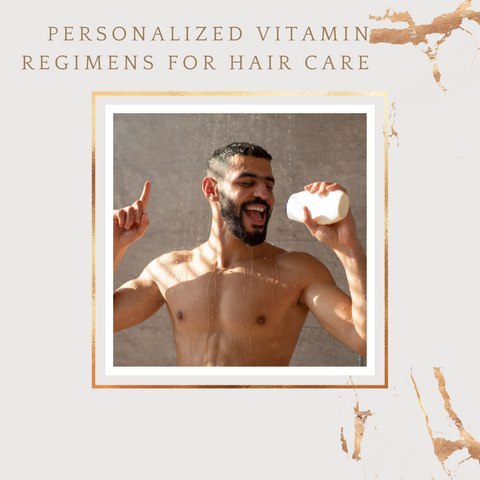
Developing a personalised vitamin prescription for hair care entails taking into account individual nutritional requirements, potential inadequacies, and overall health state. While vitamins can help promote healthy hair, it's important to prioritise a well-balanced diet above excessive supplementation. Here's how to make a customised vitamin regimen for hair care. Individual needs should be assessed, nutrient-rich foods should be prioritised, supplementation (if necessary), vitamins for hair health should be used, a personalised strategy should be used, and progress should be tracked. Before beginning any vitamin regimen or making any dietary changes, always consult with a healthcare provider or a licenced dietitian. Based on your specific health state and demands, they may provide personalised guidance, analyse individual needs, and provide a safe and effective approach to supporting healthy hair development.
Consultation with dermatologists for tailored solutions
Consulting a dermatologist for tailored hair-related solutions is a proactive step towards resolving specific hair-related difficulties and receiving personalised recommendations. Dermatologists specialise in the diagnosis and treatment of skin, hair, and nail disorders, as well as different hair and scalp conditions that may affect hair health and growth. What to expect and how a dermatologist can help with hair-related issues are as follows:
-
Comprehensive Evaluation: A dermatologist will examine your scalp, hair, and overall health history thoroughly. They may inquire about your lifestyle, nutrition, medications, and any current medical disorders that may affect your hair's health.
-
Diagnosis and Treatment: A dermatologist can diagnose numerous hair-related concerns based on the evaluation, such as alopecia (hair loss), dandruff, scalp infections, or other underlying conditions influencing hair growth. They will recommend treatment alternatives that are suited to your unique situation.
-
Personalised Recommendations: Dermatologists can provide personalised recommendations, which may include topical treatments, prescription medications, lifestyle modifications, dietary advice, or specific hair care routines to address your concerns.
-
Medical Procedures: Depending on the severity and type of hair problem, dermatologists may recommend procedures such as corticosteroid injections, light therapy (phototherapy), platelet-rich plasma (PRP) therapy, or hair transplants.
-
Follow-Up Care: Dermatologists frequently schedule follow-up appointments to monitor progress, make treatment plan adjustments as needed, and address any new concerns that arise.
-
Professional Advice: Dermatologists can advise on how to maintain a healthy scalp and hair, recommend appropriate hair care products, and provide advice on how to manage specific hair conditions.
Seeking the assistance of a dermatologist guarantees that you receive accurate diagnoses, personalised treatment strategies, and professional advice tailored to your hair concerns. If you have recurrent hair difficulties, including excessive shedding, bald patches, scalp discomfort, or changes in hair texture, a dermatologist appointment is highly suggested for expert advice and specialised solutions.
Over-the-counter vs. prescription hair growth supplements
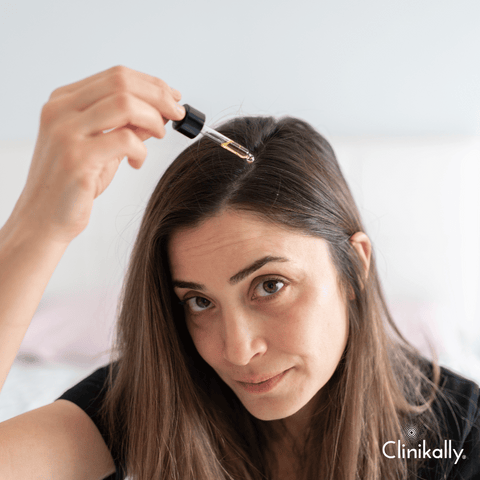
When it comes to hair growth vitamins, both over-the-counter (OTC) and prescription choices are available. Understanding the distinctions between the two will help you make an informed decision about which is best for your requirements.
-
Accessibility, Ingredients, Effectiveness, Safety, and Cost are all factors to consider when purchasing over-the-counter (OTC) supplements.
-
Medications, effectiveness, consultation required, cost, and insurance coverage are all aspects of prescription hair growth treatments.
Individual considerations such as the underlying cause of hair loss, the severity of the condition, personal preferences, budget, and medical advice from a healthcare professional all play a role in deciding between OTC supplements and prescription treatments for hair development. Before beginning any hair growth routine, especially prescription treatments, it is critical to check with a healthcare expert, preferably a dermatologist. They can provide an accurate diagnosis, explain appropriate treatment alternatives and potential side effects, and provide personalised advice based on individual needs and health status.





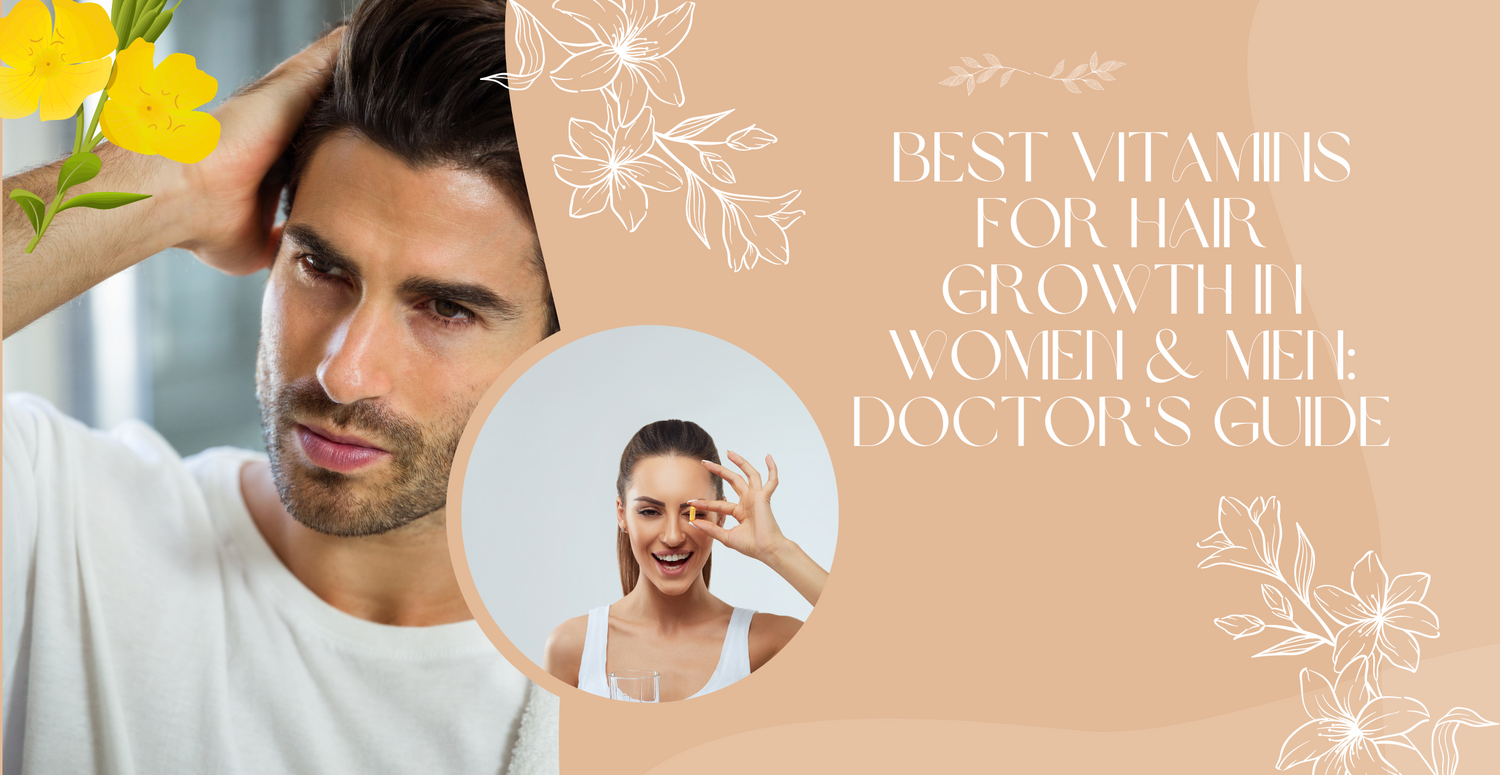




























1 comment
Ajay
Thank you for sharing this informative article; it will really help us.
Thank you for sharing this informative article; it will really help us.